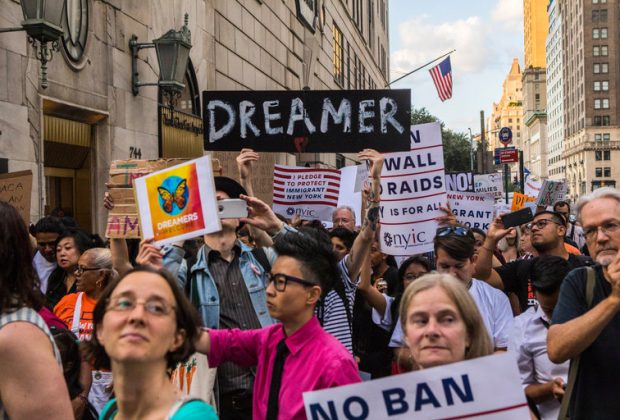By: David Leonhardt, The New York Times ~
Immigration hard-liners have the benefit of being able to make a very clear case: The United States should enforce its laws.
“If this was any other subject, if this was tax evasion and we said, well, they only really violated a little bit of — they only cheated on their taxes a little, you wouldn’t be saying hey, should they really be going to be prison or should they be getting a fine?” as Sean Spicer argued from the White House lectern, when he was still press secretary.
“At some point, laws are laws,” Spicer said. “And if people have a problem with the law, whether it’s at the local, state or federal issue, then we should petition our lawmakers and the executive at that particular branch of government and change it.”
The Trump administration now seems ready to take that argument to its extreme and put 800,000 Dreamers — people who entered this country illegally when they were children — at risk of deportation. In technical terms, the administration would end a program known as DACA, for Deferred Action for Childhood Arrivals.
The human cost of the change would be severe. The Dreamers “grew up in America, and now have no other country to call home. Uprooting these young people would cause them irreparable harm,” writes David Coleman, the president of The College Board, an organization that usually avoids politics. The policy change, Elizabeth Aranda, a University of South Florida professor writes for CNN, “would take many back to the times where they felt frightened and insecure at every move.”
In addition to the human cost, I think it’s also important to engage with Trump officials’ philosophical argument — that laws are laws, and they’re simply enforcing them. Tidy as it may sound, it’s wrong. It’s wrong because it ignores the many kinds of law-breaking that our government ignores.
I broke the law yesterday, for instance. I jaywalked in downtown Washington, and I wasn’t stopped by the police. The day before, I broke the law by driving over the speed limit. More significantly, many immigrants who entered the United States in the early 20th century violated the law when doing so, such as by falsifying documents.
The government didn’t devote its resources to pursuing them — or toward arresting me this week — because it has far more important priorities. “Prioritizing the use of resources in law enforcement is nothing new,” Janet Napolitano, the former prosecutor, governor and secretary of Homeland Security, wrote in a Times op-ed last year. “It is known as ‘prosecutorial discretion,’ and we can see it all around us — from local police departments deciding whom to pull over instead of stopping every speeding car to federal prosecutors focusing on larger financial fraud instead of going after every bad check.”
Dreamers are an almost perfect subject for prosecutorial discretion. They didn’t knowingly violate the law; their parents or other relatives did. And the Dreamers are, by definition, leading law-abiding, productive lives. (Otherwise, they would already be subject to deportation, since the federal government has rightly made a priority of pursuing law-breaking undocumented immigrants.)
Taking steps to deport them is both cruel and inconsistent with our legal values. If the Trump administration has decided it now wants to be a stickler for the letter of the law, there are many other areas it should instead be considering.
I recommend Bret Stephens’s column on Dreamers from June as well as Linda Greenhouse’s new op-ed on the big immigration case before the Supreme Court this term.
In a related story, younger Americans are increasingly alienated by today’s Republican Party, as Republican pollster Kristen Soltis Anderson explains in Ron Brownstein’s latest column for The Atlantic.
Are you a onetime Trump supporter who has soured on the president, or do you know someone who fits this description? The Times wants to hear from people who do.
Source: New York Times







